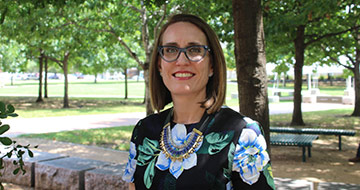Posted on January 2, 2023 by Amanda Cerreto

standard
The fourth cohort has been announced for iAspire Leadership Academy, a structured development experience intended for leaders in higher education funded by the National Science Foundation (NSF). Among the two UTSA selections was Johnelle Sparks, senior associate dean for faculty success and administration and a professor in the Department of Demography in the UTSA College for Health, Community and Policy (HCAP).
Fellows enhance leadership skills, tailored specifically for the higher education environment, and gain strategies for influencing institutional change.
iAspire is part of the NSF’s INCLUDES Aspire Alliance, a national foundation working toward increasing the diversity of STEM faculty across the nation. In 2019, UTSA was selected as one of 15 public research universities to participate in its pilot program – and Sparks was there from the beginning.
When Sparks first took part in the NSF’s task force, it was a holistic look at how the university was addressing issues around diversity, equity and inclusion (DEI) in STEM. In these workshops, university participants asked questions regarding faculty recruitment, retention and promotion, faculty leadership pipelines, student leadership opportunities within STEM and more. “We explored how we can align specific types of KPIs and other kinds of indicators at the university level to help guide these efforts,” Sparks said, “so that we're not just saying that we are going to be a campus that prioritizes DEI in STEM and all disciplines, but that we use this as kind of a guiding framework.”
After the initial training and framework building, Sparks was selected to participate in mentor training with the Center for the Improvement of Mentored Experiences in Research. After completing the training course at UCLE in September 2019, Sparks and Judy Vernon, director of faculty training and development, created a course using the materials from CIMER to be more specific to faculty at UTSA and offer the first multi-week course in Spring 2020.
The iAspire Leadership Academy runs for two years, with several week-long sessions in various parts of the country. The cohort just wrapped up their first session in Chicago, and will have another this summer in Washington, D.C.
Prior to the first session, the cohort of 20 faculty completed several assessments, including a comprehensive 360 review with feedback from managers, peers and direct reports. Sparks can already see the benefits of this type of work after the first week.
“We were given a lot of time to really reflect on our assessments and apply that feedback thinking through specific types of activities,” Sparks said. “We did a full day on conflict management using the skills learned from these assessments and our individual responses to think about how to deal with difficult conversations.”
Sparks has specific goals for what she plans to bring back to HCAP and UTSA from her time with iAspire. “I want to work on a professional development series for faculty,” she said. “Thinking beyond what you may do relative to the normal workload around research, teaching and service – what are some other goals faculty might have, and what would be some professional training opportunities that could be available?”
“Dr. Sparks is a leader in faculty professional development and mentoring at UTSA and the iAspire training has provided her more tools in this regard,” said Lynne Cossman, dean of the college. “She’s just been back from the first session for a couple weeks and is already putting her freshly-honed skills to work. I look forward to the benefits HCAP and UTSA will see from her further training.”
Sparks plans to pilot her professional development program within HCAP, and then work with counterparts across the university and academic affairs to discuss more broad offerings for faculty. She is grateful for the opportunity to serve in this role and is excited about what she can bring back to the university.
“There's a lot of value to allowing faculty the chance to have some time to think through these issues,” Sparks said. “I’m thankful I have protected time to devote to it, because I definitely continue to learn. It’s helping me to explore how I can use some of these resources and skills to bring back and make this available for people that might not get this opportunity.”

